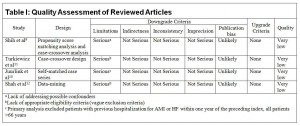Concern for Myocardial Infarction Risk Associated with Proton Pump Inhibitor Use in Patients With No Underlying Cardiovascular Disease
ABSTRACT
Background: Proton pump inhibitors (PPIs) are the drugs of choice when it comes to the treatment of dyspepsia and gastroesophageal reflux disease (GERD). Recently, the FDA issued a warning regarding concomitant use of omeprazole, a PPI, with clopidogrel as it interferes with CYP2C19 activity. The pharmacological activity of clopidogrel is decreased, possibly increasing the potential for an acute cardiac event. However, there is limited evidence with regards to myocardial infarct (MI) risk with use of PPIs alone. The purpose of this review is to explore if PPI use is associated with an increased MI risk in patients with no underlying cardiovascular disease.
Methods: An exhausted search of available medical literature was performed using MEDLINE-Ovid, MEDLINE-Pubmed, Web of Science, and CINAHL using the keywords proton pump inhibitors, myocardial infarction, and epidemiology. Relevant articles were assessed for validity using the Grading of Recommendations Assessment, Development, and Evaluation (GRADE) system.
Results: Four articles met eligibility criteria and were included in this systematic review. Two of the articles were case-crossover analyses. The other two studies were a self-matched case-series design and data-mining analysis, respectively. There were some consistent results regarding an increased MI risk with PPI use in patients with no prior history of MI. Studies were limited with regards to the specific population in question, actual PPI dose and compliance, and failure to control confounding factors including obesity, smoking, and family history of coronary artery disease. Further research is warranted to address these concerns as well as the long-term risks associated with PPI therapy.
Conclusion: There were limited studies to evaluate the subsequent risk of MI with the lone use of PPIs in patients with no underlying cardiovascular disease. Thus far, they suggest that PPI use may be associated with an increased risk for MI. Pending further research however, the benefits of PPI use may outweigh the risks of adverse cardiovascular events.
Keywords: Proton pump inhibitors, myocardial infarction, epidemiology
(Click on image to enlarge.)
REVIEWED STUDIES:
Shih CJ, Chen YT, Ou SM, Li SY, Chen TJ, Wang SJ. Proton pump inhibitor use represents an independent risk factor for myocardial infarction. Int J Cardiol. 2014;177(1):292-297. doi: 10.1016/j.ijcard.2014.09.036 [doi].
Juurlink DN, Dormuth CR, Huang A, et al. Proton pump inhibitors and the risk of adverse cardiac events. PLoS One. 2013;8(12):e84890. doi: 10.1371/journal.pone.0084890 [doi].
Turkiewicz A, Vicente RP, Ohlsson H, Tyden P, Merlo J. Revising the link between proton-pump inhibitors and risk of acute myocardial infarction-a case-crossover analysis. Eur J Clin Pharmacol. 2015;71(1):125-129. doi: 10.1007/s00228-014-1779-6 [doi].
Shah NH, LePendu P, Bauer-Mehren A, et al. Proton pump inhibitor usage and the risk of myocardial infarction in the general population. PLoS ONE [Electronic Resource]. 2015;10(6):e0124653.
AUTHOR: Natasha Ludwig is currently completing her second year in the School of PA Studies at Pacific University, Oregon. She will graduate with an MS degree in August, 2016.





No Comments Yet